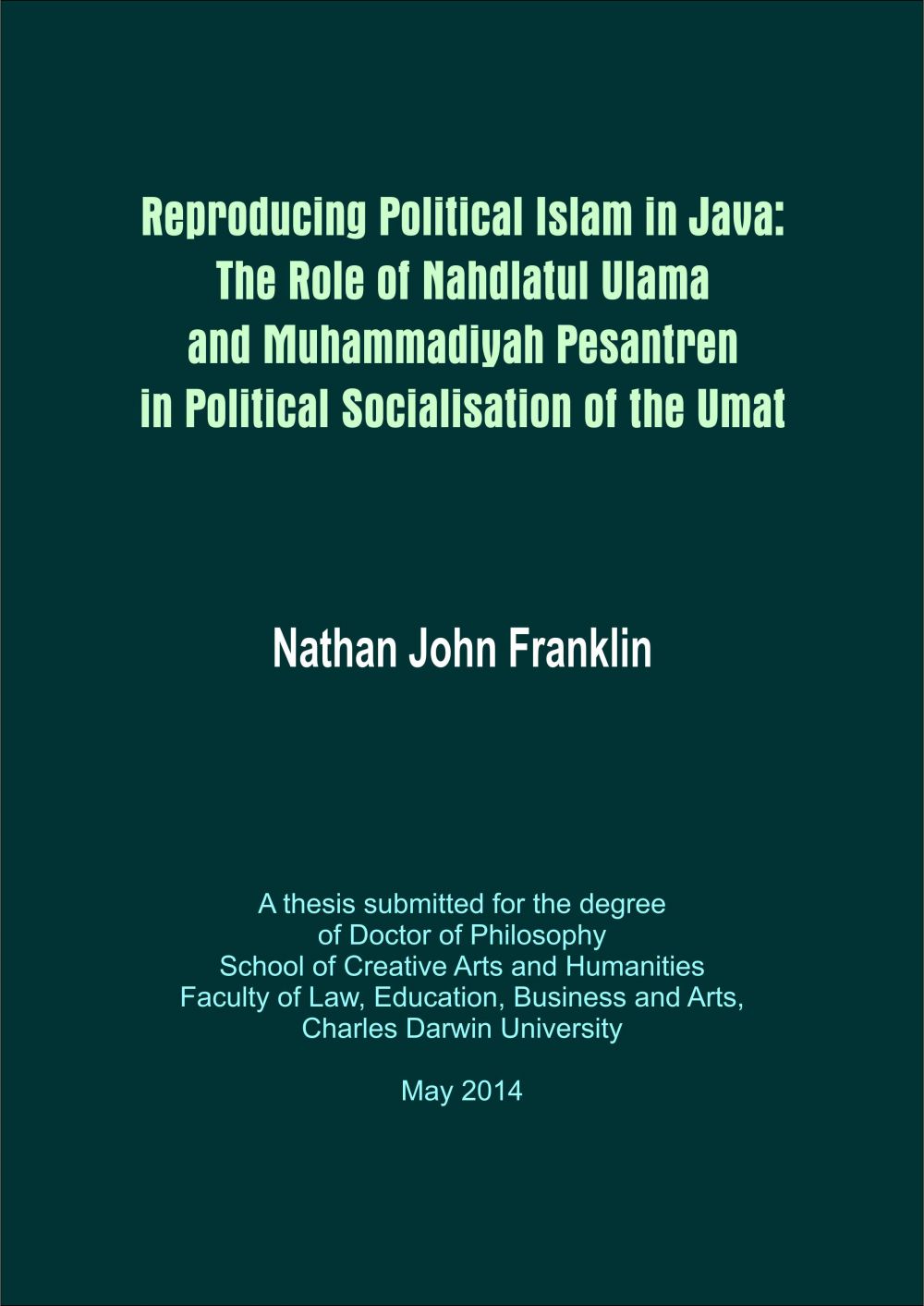The Role of Nahdlatul Ulama and Muhammadiyah Pesantren in the Political Socialisation of the Umat
Dibaca: 1777
Penulis : Nathan John Franklin
Reproducing Political Islam in Java: The Role of Nahdlatul Ulama and Muhammadiyah Pesantren in the Political Socialisation of the Umat
Nathan John Franklin
Abstract This thesis contributes to the scholarly understanding of Nahdlatul Ulama (NU) and Muhammadiyah and the role these Muslim organisations perform in the political socialisation of Islam through their affiliated pesantren (Islamic boarding schools). The study has a regional focus, concentrating on two case studies, both in Lamongan, East Java; Pesantren Sunan Drajat represents the NU pesantren system, and Pesantren Karangasem portraying the Muhammadiyah version of pesantren. Bourdieu’s concepts regarding habitus, field, symbolic capital, symbolic power, and symbolic violence are used to examine the pesantren system and the way it reproduces socio-religious identity through the values that santri (students) acquire. Moreover, this study looks at how pesantren and their kyai (headmasters) have influenced the political culture of the umat (religious community). Participant observation provided a detailed insight into the pesantren system, which was complemented with empirical data from election results and a survey to assess the voting habits of Lamongan residents.
The development of political Islam in Lamongan is tied to the history of Islam and the strong pesantren culture in the district. This resulted in the popularity of the Islamic political parties and parties that promote Muslim identity, including Masyumi and the NU party at the 1955 general election; the United Development Party (Partai Persatuan Pembangunan, PPP) during the Suharto regime (1966-1998); and the National Awakening Party (Partai Kebangkitan Bangsa, PKB) and National Mandate Party (Partai Amanat Nasional, PAN) in the postSuharto era. Pesantren Sunan Drajat educates its santri to be obedient, and its headmaster demands the community faithful follow his guidance in supporting political candidates that defend the interests of NU. Pesantren Karangasem on the other hand teaches its santri to think critically, but the school’s educators encourage their followers to support cadres that represent the Muhammadiyah constituency. Although people consider the opinions of their local kyai, people are not subservient to their political instructions. Despite this, NU and Muhammadiyah identity remains a salient influence on voters in Lamongan. However, political disunity among NU figures has increased the electoral appeal of the Muhammadiyah candidates, particularly in elections for district head (pemilihan kepala daerah, Pilkada).
Table of Contents
Chapter One:
Introduction 2
Background 4
Pesantren 8
The Arrival of Islam and the Emergence of Islamic Movements 10
The Socialisation Process of Islam 16
Political Islam 17
Muhammadiyah and Nahdlatul Ulama 20
Methodology: Approach to the Study 21
Literature Review 24
Chapter Outline 30
Chapter Two:
Pesantren Pedagogy and the Inculcation of a ‘Santri Habitus’ 34
Field and Habitus 37
Cultural Capital and Symbolic Violence 40
Reproduction 45
Comparing French Elite Schools and Javanese Pesantren 48
Kyai and Symbolic Violence 50
Summary of the Theory 54
Chapter Three:
Political Islam 57
Islam and Muslim Identity 60
Islam and the Indonesian Republic 61
Non-state Actors and State Actors in Political Islam 63
Growing Islamisation 68
Profile of Major Political Parties Post-Suharto 70
Political Islam and the Pesantren System 75
Kyai in Muslim Politics 78
Summary: Democracy and Islam 81
Chapter Four:
History and Profile of Lamongan 87
An Overview of Lamongan 87
Paciran Subdistrict 90
Economic Overview 91
Early Modern Period and Islamisation of Lamongan 95
Sunan Drajat and His Legacy 103
Dutch Occupation of Lamongan 106
From Japanese Invasion to Independence 109
Conclusion 110
Chapter Five:
Islamic Movements and Politics in Lamongan 113
NU and Muhammadiyah and their Impact on the Community 113
NU in Lamongan 115
NU and Local Politics 118 Muhammadiyah in Lamongan 123
Islamic Defenders’ Front 129
Conclusion: Lamongan in the Twenty First Century 132
Chapter Six:
The Case Study of Pesantren Sunan Drajat 135
Overview 136
Santri Numbers 137
Kyai Maftukan 140
Kyai Abdul Ghofur 141
Average Day of Santri at Pesantren Sunan Drajat 143
Pengajian 146
The Morning Pengajian 146
Visitors and Guests 147
Abdul Ghofur: A Traditionalist Kyai 148
Traditionalism 152
The Relationship with the Local Community and Government 155
Business Interests 157
Radio Station 158
Agribusiness 159
Sunan Drajat Legacy 160
Village Pengajian 161
Conclusion 162
Chapter Seven:
Pesantren Sunan Drajat and Political Islam 165
History of Political Involvement 167
Views on Politics 170
Post-Suharto Politics 174
Kyai Ghofur and Gerindra 179
Pilkada Elections 184
Survey Data from Pesantren Sunan Drajat 193
The 2008 Gubernatorial Election 196
Conclusion 198
Chapter Eight:
The Case Study of Pesantren Karangasem 203
Pesantren Karangasem 206
The Pesantren Karangasem Complex 208
Kyai Abdurrahman Syamsuri 210
Joining Muhammadiyah 214
The Pesantren Karangasem Family 215
Muhammadiyah Leader 216
The Split 219 Pembaruan at Pesantren Karangasem 223
Definition of Education 229
Educational Curriculum 230
Muhammadiyah Influence 232
Halaqah Studies 233
Foreign Languages 234
Kyai Mu'rob and Pengajian 235
Average Day of Santri at Pesantren Karangasem 237
Kemuhammadiyahan 241
Conclusion 242
Chapter Nine:
Pesantren Karangasem and Political Islam 245
Development of Political Islam 249
Impact of Reformasi and Amien Rais 253
Party Politics 258
Islamic Political Aspirations 261
Survey Data from Pesantren Karangasem 265
Political Compromise 268
Provincial and National Elections 269
Lamongan Pilkada 270
FPI and Links to JI 275
Conclusion 280
Chapter Ten:
Conclusion 286
or HERE
Tags: ReproducingPoliticalIslaminJavaTheRoleofNahdlatulUlamaandMuhammadiyahPesantreninthePoliticalSocialisationoftheUmat , NathanJohnFranklin








